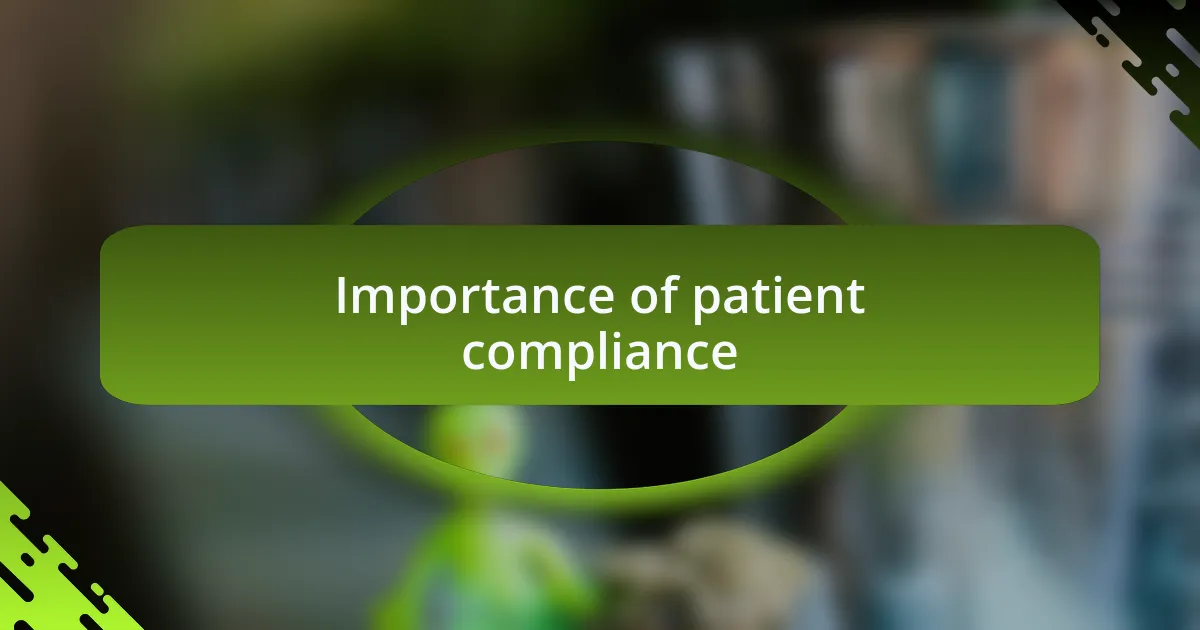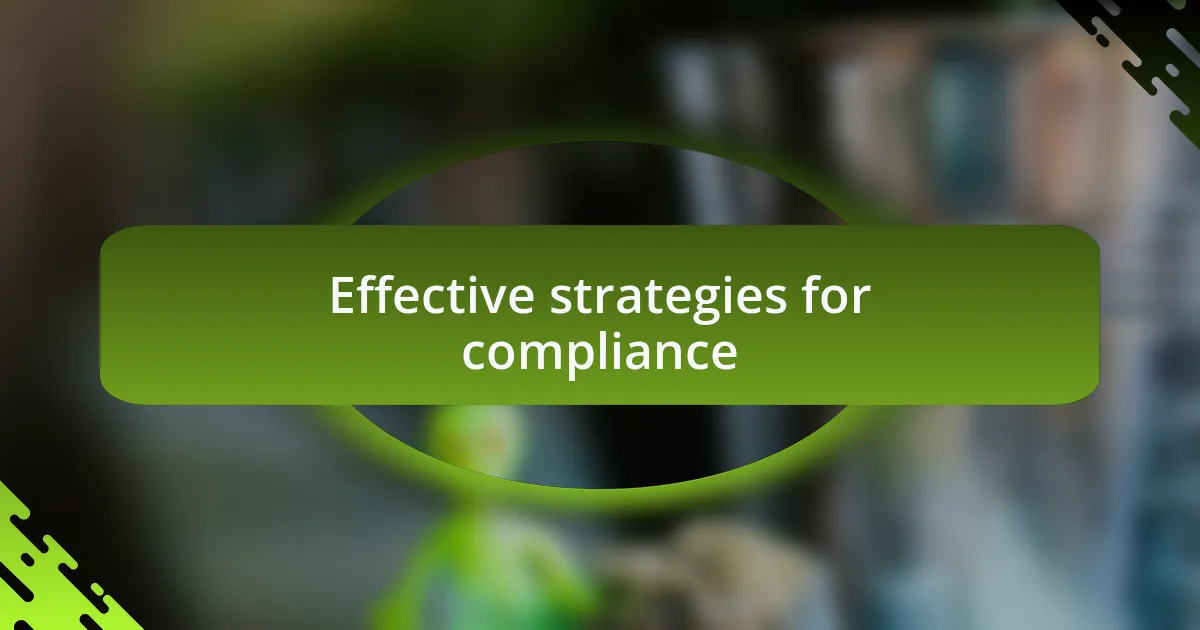Key takeaways:
- Patient compliance programs are essential for effective treatment, simplifying information and fostering communication between healthcare providers and patients.
- Personalized education and community support networks significantly enhance patient adherence to treatment plans.
- Challenges in compliance include lack of understanding of dosing, diverse patient needs, and social stigma surrounding cannabis use.
- Tailored approaches and establishing trust can greatly improve patient engagement and compliance outcomes.

Understanding patient compliance programs
Patient compliance programs play a critical role in ensuring that individuals follow their treatment plans effectively. I recall a conversation with a patient who expressed frustration over understanding their medication regimen. They felt overwhelmed by medical jargon and complex instructions, which underscored how vital these programs are in simplifying information and helping patients navigate their health journeys.
When I think about patient compliance programs, I realize they are not just boxes to check; they create a meaningful dialogue between healthcare providers and patients. For instance, I’ve seen programs that involve regular follow-ups, personalized care plans, and education on the effects of cannabis products. These components foster a sense of partnership that often leads to better health outcomes.
Have you ever considered how a supportive environment can impact adherence to treatment plans? From my experience, programs that include community support and resources not only empower patients but also reduces feelings of isolation. It’s truly rewarding to witness individuals transform their approach to health when they feel cherished and guided through their medical journeys.

Importance of patient compliance
Patient compliance is crucial because it directly influences treatment efficacy. I remember working alongside a patient who diligently followed their cannabis dosage schedule, and their improvement was evident in just a few weeks. This transformation reinforced my belief that adherence not only enhances individual health outcomes but can also reduce overall healthcare costs by minimizing complications.
Consider for a moment the myriad barriers patients encounter, from anxiety about their condition to confusion over medication instructions. I once spoke to a caregiver who struggled to help a loved one stay on track, and it became clear that patient compliance programs must address these emotional hurdles. By offering empathetic support and clear communication, these programs empower patients to feel more confident and engaged in their treatment.
The journey towards better health can often feel lonely, but when patients actively participate in their plans, everything changes. I have seen firsthand how effective reminders and educational resources not only keep patients on track but also instill a sense of hope. Isn’t it fascinating how fostering accountability through support can lead to remarkable transformations in a patient’s life?

Overview of cannabis retail industry
In recent years, the cannabis retail industry has evolved rapidly, moving from a largely underground market to a legal and regulated framework in many parts of North America. I recall visiting a local dispensary just after legalization, and the atmosphere was electric. Customers were excited, curious, and, at times, overwhelmed by the array of products available. This shift not only reflects changing attitudes towards cannabis but also highlights the industry’s potential for economic growth and job creation.
As the market expands, so does the complexity of navigating regulations and consumer preferences. I’ve seen how dispensaries that prioritize customer education and quality control stand out among their competitors. It’s fascinating to consider how tailored experiences can shape consumer loyalty—don’t you think that knowing you’re buying from a knowledgeable source creates trust? Dispensaries that offer guidance not only help customers make informed choices but also foster a sense of community.
Innovation also plays a crucial role in the cannabis retail landscape. Just a few years ago, I attended a trade show where I was amazed by the advancements in product offerings, such as edibles infused with specific cannabinoid profiles aimed at targeted health benefits. This level of sophistication in products showcases the industry’s commitment to meeting diverse consumer needs. As we continue to explore this landscape, it’s clear that the potential for growth and development within the cannabis retail sector is immense.

Challenges in patient compliance
Navigating patient compliance in cannabis programs presents a series of unique challenges. From my experience, one major hurdle is the lack of understanding about dosing and effects. I often hear patients express confusion over how to properly use their products, which can lead to inconsistent use and ultimately, frustration. It’s a reminder that education isn’t just helpful; it’s essential for fostering proper compliance.
Another significant challenge is the diverse range of medical conditions treated with cannabis. Each patient comes with individual needs, and thus their compliance varies. I once spoke with a patient who mentioned how anxiety made it difficult to remember their dosing schedule. This illustrates the importance of tailoring compliance programs to address specific needs and barriers.
Social stigma around cannabis still lingers in some communities, which can impact how patients approach these programs. I’ve met individuals who shy away from discussing their cannabis use, fearing judgment from family or friends. This stigma can create an environment where patients might not fully engage with their treatment plans, ultimately undermining the effectiveness of compliance initiatives. How can we create a supportive atmosphere that encourages patients to prioritize their well-being without fear?

Effective strategies for compliance
When thinking about effective strategies for compliance, I find that personalized education is crucial. I remember conducting a workshop where I used visual aids and practical demonstrations to teach patients about different strains and their specific effects. The transformation in understanding was astonishing. Patients left feeling empowered, which translated into more consistent compliance with their treatment regimens.
In my experience, building a community support network can significantly influence patient adherence. Recently, I facilitated a support group where individuals shared their successes and struggles. Hearing stories from others helped to normalize their experiences and foster a sense of belonging. It’s interesting how connection can be a powerful motivator; when patients feel supported, they’re more likely to stick to their compliance strategies.
Tracking progress in a simple, user-friendly way can also enhance compliance. I know some patients who use apps to log their doses and symptoms, which makes a world of difference. It not only helps them stay accountable but also provides valuable feedback they can discuss with their healthcare providers. Have you thought about how technology can serve as a compliant ally in your journey?

Personal reflections on compliance programs
Reflecting on compliance programs, I often think about the emotional journey patients navigate. I recall a patient who struggled to remember their dosage schedule. After incorporating reminders through text alerts, I watched a remarkable change. Their relief at no longer feeling anxious about forgetting was palpable, and this simple adjustment significantly boosted their adherence.
I’ve also seen firsthand how establishing trust impacts compliance. I remember a particularly poignant conversation with a patient who had previously felt judged by healthcare professionals. By creating a safe space for open dialogue, I witnessed their barriers diminish. It reinforced my belief that when patients feel respected and understood, they are far more likely to comply.
In discussing compliance, I sometimes wonder about the impact of individualized approaches. One of my patients thrived with a tailored plan that considered their lifestyle and preferences. It raised an essential question for me: How often do we overlook unique patient needs in compliance programs? This experience highlighted that a one-size-fits-all strategy may not be the answer, and focusing on personal needs can truly drive better compliance outcomes.